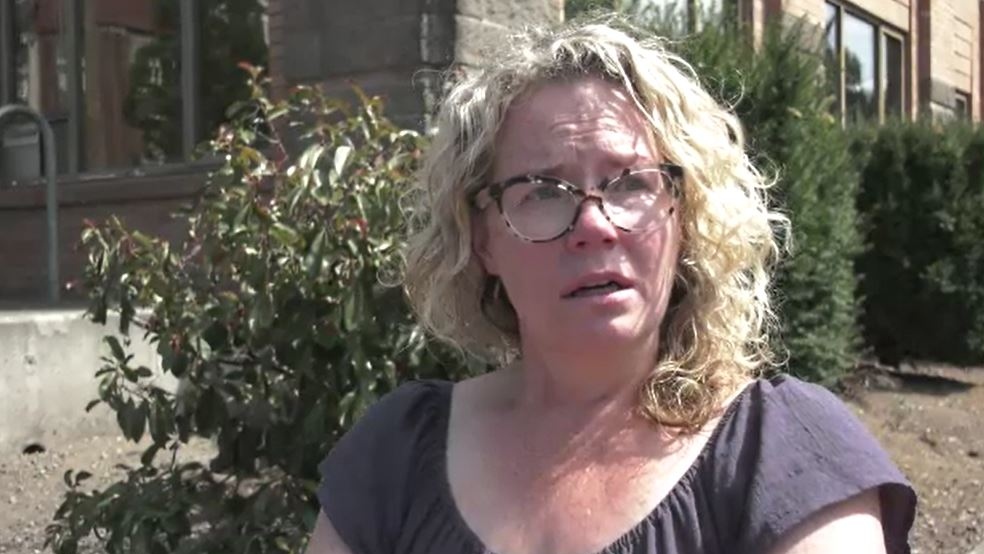'They're going to end up dead like my brother is': Victoria man's death blamed on toxic drug additive
British Columbia's toxic drug crisis has claimed another life on the streets of Victoria, just hours after health officials issued a warning about a spike in drug poisoning in the Vancouver Island region.
Chris Schwede, 49, was found dead Thursday morning in his tent on Pandora Avenue, in the heart of Victoria's overlapping crises of addiction, homelessness and mental illness.
Inside Schwede's tent was a blue-tinted form of crack cocaine that first appeared in the city on Wednesday, according to Grant McKenzie, who knew Schwede through his work at Our Place Society, the main social services provider in the area.
"They’ve added a new animal tranquilizer to this turquoise rock," McKenzie said. "And as we see behind me, it is fatal to humans. So they’ve added this in along with fentanyl, carfentanyl, benzos – a real cocktail that’s just leading to straight poison."
The tranquilizer is believed to be xylazine, which has appeared in street drugs in the B.C. Interior and the eastern United States in recent weeks.
"We had several overdoses yesterday from this drug," McKenzie added. "This drug also has a way of sending people directly into psychosis."
'MY BROTHER JUST DIED'
Schwede's sister Candice Csaky says her brother died of an overdose because there was no publicly funded care available to him.
"He came to me multiple times in the last year and said he was done with this life. He was going to get a job," Csaky told CTV News. "He was offered a job and he was supposed to start on Monday but he relapsed on the weekend because he didn't have support systems in place."
 Candice Csaky near the tent where her brother was found dead on Aug. 18, 2022, on Victoria's Pandora Avenue. (CTV News)
Candice Csaky near the tent where her brother was found dead on Aug. 18, 2022, on Victoria's Pandora Avenue. (CTV News)
On Tuesday, B.C.'s chief coroner revealed that more than 10,000 people have died in the province since health officials declared a public health emergency over illicit-drug deaths in April 2016.
Coroner Lisa Lapointe said B.C. is on track to lose another record number of people to the toxic drug supply this year, with the number of deaths in the first half of 2022 surpassing those in the same period in any previous year.
At least 1,095 British Columbians are believed to have died between January and June this year, at an average of six deaths per day, according to data from the BC Coroners Service.
More than three-quarters of the those who died this year were male, mostly men between the ages of 30 and 59.
"My brother just died and he should not have died," Csaky said. "COVID isn’t the pandemic we need to be afraid of in this country. This is the pandemic. People dying on this street every single day."
'A CLEAN SUPPLY WOULD HAVE SAVED HIS LIFE'
The Our Place Society spokesperson says access to a safe and tested supply of street drugs would have prevented Thursday morning's death, and others like it.
"A clean supply would save lives today," McKenzie said. "It's not the ultimate answer, but it would have saved this life today. Around me you saw the devastation of his family members, people who cared for this young man. A clean supply would have saved his life."
In a statement Tuesday, B.C. Minister of Mental Health and Addictions Shelia Malcolmson said: "Each and every person who died this year due to the poisoned drug supply was special and important and represents a deep loss to our communities."
Last year, the B.C. government committed $22.6 million over three years to plan a phased implementation and evaluation of a prescribed safe supply of street drugs for users in the province.
 Candice Csaky stands near the tent where her brother was found dead on Aug. 18, 2022, on Victoria's Pandora Avenue. (CTV News)
Candice Csaky stands near the tent where her brother was found dead on Aug. 18, 2022, on Victoria's Pandora Avenue. (CTV News)
For Csaky, that effort is already too late.
"I don't know who these people are in power, but they're not down here checking on their brother every day, making sure they're still alive," she said.
"When somebody comes to you who is an addict – a family member, a loved one – and they say, 'I'm done with this life. I never want to go down here again. I want to get my life back,' there needs to be a rehab facility you can walk them into that day that is publicly funded," she said.
"Do you think that drug addict is going to be saying the same thing four months from now? They're not. They need help today. Right now. Not in four months. Not on a waitlist," she added. "Because that opportunity is likely not to come again and they’re going to end up dead like my brother is."
CTVNews.ca Top Stories

opinion Tom Mulcair: Prime Minister Justin Trudeau's train wreck of a final act
In his latest column for CTVNews.ca, former NDP leader and political analyst Tom Mulcair puts a spotlight on the 'spectacular failure' of Prime Minister Justin Trudeau's final act on the political stage.
B.C. mayor gets calls from across Canada about 'crazy' plan to recruit doctors
A British Columbia community's "out-of-the-box" plan to ease its family doctor shortage by hiring physicians as city employees is sparking interest from across Canada, says Colwood Mayor Doug Kobayashi.
'There’s no support': Domestic abuse survivor shares difficulties leaving her relationship
An Edmonton woman who tried to flee an abusive relationship ended up back where she started in part due to a lack of shelter space.
opinion King Charles' Christmas: Who's in and who's out this year?
Christmas 2024 is set to be a Christmas like no other for the Royal Family, says royal commentator Afua Hagan. King Charles III has initiated the most important and significant transformation of royal Christmas celebrations in decades.
Baseball Hall of Famer Rickey Henderson dead at 65, reports say
Rickey Henderson, a Baseball Hall of Famer and Major League Baseball’s all-time stolen bases leader, is dead at 65, according to multiple reports.
Arizona third-grader saves choking friend
An Arizona third-grader is being recognized by his local fire department after saving a friend from choking.
Germans mourn the 5 killed and 200 injured in the apparent attack on a Christmas market
Germans on Saturday mourned the victims of an apparent attack in which authorities say a doctor drove into a busy outdoor Christmas market, killing five people, injuring 200 others and shaking the public’s sense of security at what would otherwise be a time of joy.
Blake Lively accuses 'It Ends With Us' director Justin Baldoni of harassment and smear campaign
Blake Lively has accused her 'It Ends With Us' director and co-star Justin Baldoni of sexual harassment on the set of the movie and a subsequent effort to “destroy' her reputation in a legal complaint.
Oysters distributed in B.C., Alberta, Ontario recalled for norovirus contamination
The Canadian Food Inspection Agency has issued a recall due to possible norovirus contamination of certain oysters distributed in British Columbia, Alberta and Ontario.


































